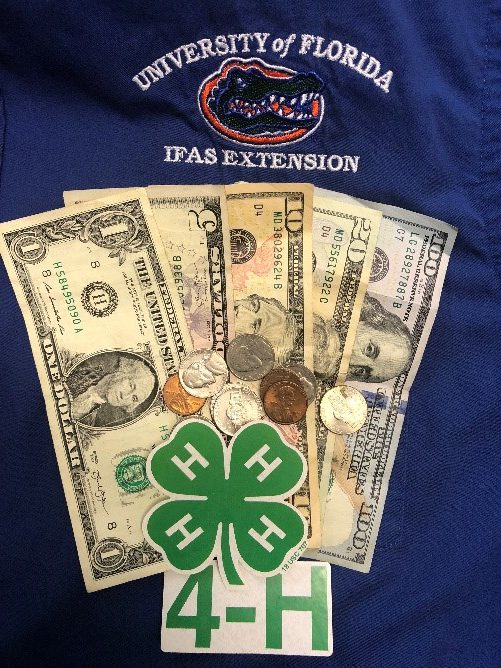
by pmdavis | Jan 10, 2020
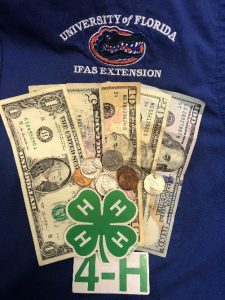
Are you financially savvy?
As a parent, I worry about children and their money habits! They often have trouble distinguishing between a need and a want. I often wonder if I am empowering them to be financially savvy. I know this is a topic that I continually work on for myself. It is important to start teaching healthy money habits early! It is also important for children to hear about personal finance to understand how money works in a variety of settings: home, school, and youth organizations. I know my children receive money as gifts and it tends to “burn a hole in their pocket” until it is gone. Like adults, children need to practice making “healthy financial” decisions so that those decisions become “healthy habits,” reducing stress in their lives.
With Valentine’s Day right around the corner, you might think of helping your children or grandchildren start a savings account to provide some financial security for the future. Then, encourage them to keep adding 10-20% of any money they receive to the account for a rainy day or that big purchase they desire.
RESOURCES AVAILABLE
Extension and 4-H have several publications and project books that provide guidance in the area of personal finance on spending, saving, investing, and donating. These projects can be done in a group setting or as a self-study project. National 4-H Curricula include “Financial Champions 1: Money FUNdamentals.” This piece has activities allowing kids to develop a money personality profile and style, understand the difference in needs and wants, make informed money decisions, set financial goals, and develop a money plan.
“Financial Champions 2: Money Moves” allows kids to learn how to predict outcomes and analyze their finances. They calculate interest; determine the cost of credit; learn how to manage a checking account, explore selecting financial services, make informed marketplace decisions and discover ways of handling money. National 4-H also has free curricula you can download for older youth.
UF/IFAS Extension also has free resources about money and financial management for adults and families on a wide range of topics such as Consumer Rights, Credit and DebtManagement, End of Life Issues, Finance and Family, Personal Finances Insurance, Retirement Planning, and Saving and Investing. University of Maryland 4-H also has a program called Financial Nuggets. This is a free download giving ideas on how to teach financial decision making to youth. It is designed for family involvement. Therefore families will increase their basic financial capacity and ability to make both short-and long-term decisions regarding spending and saving. It explores topics like needs verses wants, planning and managing money using a budget, how wealth is created and built, and managing risks.
Extension and 4-H want to encourage children, teens, and families to learn about personal finance, to practice what they learn and to teach others. We really want to get 4-H members and their families on the road to being money smart consumers. For more information on financial education and tools to help you become financially savvy or get out of debt, contact your local UF/IFAS County Extension Office, or visit http://florida4h.org. 4-H is one of the nation’s most diverse organizations and includes people from all economic, racial, social, political, and geographic categories. There are no barriers to participation by any young person. Participants are given the opportunity to engage in activities that hold their personal interest, while being guided by adult volunteers. If you are interested in volunteering, please contact your local office.
by Melanie Taylor | May 1, 2019
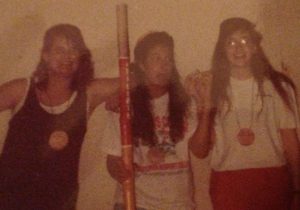
Making friends at 4-H Camp in the early 1990’s (Melanie Taylor, Gulf County 4-H Agent, on right)
4-H Summer Camp preparations are in full swing all over the state. As a 4-H agent preparing for our week of county 4-H camp, my days are busy with phone calls and emails from parents, teen counselor training, adult volunteer screenings, paperwork, paperwork and more paperwork. Although it’s busy time for me as a 4-H agent, it also allows me to reflect why I chose this career path and why there is a sense of nostalgia as I prepare for 4-H camp.
Camp Memories
I grew up in Virginia and attended 4-H camp every year from age 9-18. I was a camper that grew into a counselor-in-training and then a full-fledged counselor. Those weeks of 4-H camp were filled with hot days and warm nights, but it was worth it all for the memories I’ll have for a lifetime. I can still smell the cafeteria food and hear the sounds in the gymnasium as kids played basketball and pounded at their leather-craft projects. I still get the chills when I think about our entire camp singing around the campfire circle and patiently waiting for a canoe, filled with camp staff, to land on the lakes edge. The staff would enter the campfire circle carrying the flame and ceremoniously light the fire. I’m still connected with my 4-H camp friends through social media and/or as close friends, and we continue to share our old, blurry camp pictures from the 1990’s each year on Facebook.
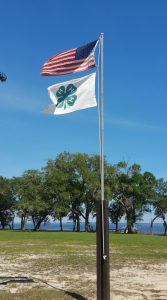
Memories to Last a Lifetime…
This is why I work hard to prepare camp for my county campers and teen counselors – I want to create similar memories for them. In 10, 20 or 30 years from now, I want them to think back on the fun moments they experienced in the Florida 4-H camping program. I want them to form friendships and make camp connections for a lifetime, whether it’s learning to kayak, fish, making arts and crafts, cooking over a campfire, singing camp songs and much more.
With all of this said, I hope you as parents will consider giving your child(ren) these special moments. The days are long, but fun, and nights are filled with campfires and hanging out with friends. When they arrive home on Friday, they’ll be exhausted but so excited to share all of the camp songs with you (prepare yourself for lots of loud, enthusiastic singing). They’ll have new friends they want you to meet and tell you camp stories they’ll always cherish.
When is Your County Camping?
In northwest Florida, there are two 4-H Camps:
4-H Camp Timpoochee in Niceville and 4-H Camp Cherry Lake in Madison.
Each county in these camping districts has one week of camp each summer. 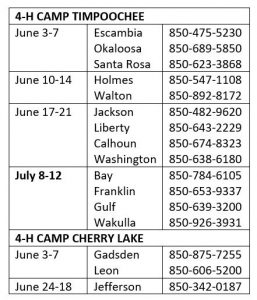 Contact your local UF/IFAS Extension Office now
Contact your local UF/IFAS Extension Office now
to find out the details and register your child for a week of fun and memories!
by Melanie Taylor | Jan 11, 2019

Be mindful and enjoy the moment.
Now that the busy holiday season is over, it’s a time to reflect on the past but prepare and refocus for the new year ahead. As we focus on the new year, it is always refreshing to have a clean slate. As the year begins to unfold, there are tips to help you manage your day-to-day stress levels. It begins with mindfulness.
What is mindfulness?
Mindfulness means paying attention in a particular way; on purpose, in the present moment, and non-judgmentally.” Dr. Jon Kabat-Zinn (1991)
Mindfulness is best thought of as a way of being rather than an activity Almost any activity can be carried out with mindful awareness.
Three Key Features of Mindful Awareness:
- Purpose – intentionally and purposefully directing your attention rather than letting it wander.
- Presence – being fully engaged with and attentive to the present moment. Thoughts about the past and future that arise are recognized simply as thoughts occurring in the present.
- Acceptance – being non-judgmental toward whatever arises in the moment. This means that sensations, thoughts, and emotions are not judged as good or bad, pleasant or unpleasant; they are simply noticed as “happening” and observed until they eventually pass (Naik, Harris and Forthun 2016).
Mindfulness is a mind-body practice that has been found to benefit both psychological and physical health. The primary psychological change that occurs during mindfulness practice is an increased awareness of thoughts, feelings, and sensations in the present moment. Over time, mindfulness practice can help you to become aware of the space between noticing experiences and reacting to them by letting you slow down and observe the processes of your mind (Black 2010).
The ultimate goal of mindfulness practice is for you to take advantage of this space so you can make more intentional decisions – to wake up from living life on autopilot, based on unproductive habits of mind
(Black 2010; Walach et al. 2007).
According to the American Psychological Association, some empirically supported benefits of mindfulness include the following (Davis & Hayes 2011):
Psychological Benefits
- Increased awareness of one’s mind
- Significantly reduced stress, anxiety, and negative emotions
- Increased control over ruminative thinking (a major cause and symptom of depression and anxiety)
- Increased mental flexibility and focus
- More working memory
- Decreased distracting thoughts
- Decreased emotional reactivity
- Increased capacity for intentional, responsive behaviors
- Increased empathy, compassion and conscientiousness of other’s emotions
Physiological Benefits
- Enhanced immune system functioning
- Increased brain density and neural integration in areas responsible for positive emotions, self-regulation, and long-term planning
- Lowered blood pressure
- Lowered levels of blood cortisol (a major stress hormone)
- Greater resistance to stress-related illnesses such as heart disease
Spiritual Benefits
- Increased self-insight and self-acceptance
- Increased acceptance of others
- Increased compassion and empathy
- Increased sense of morality, intuition, and courage to change
- Increased control over automatic behaviors
- Increased self-discipline
The question is, how many of us would like to benefit from mindfulness if it provides these positive benefits? All of us should strive to lower our stress level and enjoy our daily lives with a more positive attitude and more attentiveness. So, how can we incorporate this into our lives? The majority of this practice is about familiarizing yourself with what it feels like to be mindful, and getting better at “remembering” to maintain mindful awareness.
Experiment with creating your own mindfulness practices throughout your day. Being mindful of the sensation on the soles of your feet as you walk to your car or the taste and texture of your morning coffee can transform routine moments into deeply satisfying practices. However, having a ritualized and structured practice can be beneficial. To find out more about practicing mindfulness and how to incorporate a more structured practice in your life visit read Mindfulness: An Introduction.
Sources: Mindfulness: An Introduction. 2013, 2016. Retrieved from the UF/IFAS Extension Electronic Data Information System: https://edis.ifas.ufl.edu/fy1381. Publication #FCS2335
by Melanie Taylor | Dec 14, 2018

Aim to find JOY in this holiday season.
As the holiday season quickly approaches, many people are filled with extra holiday cheer and enthusiasm. Some are jolly but still overwhelmed with all of the activities, decorating, and shopping that needs to be completed. Then, there are those that find the holiday season as a reminder of things such as the death of a loved one, family feuds, divorce…the list goes on. If you are feeling this way, here are a few tips to make getting through the season a little bit easier.
- Feel your emotions – Many people want to suppress their sadness or anxiety, but this only makes it worse. We are all allowed to grieve, cry and feel mad at times. If you feel this way, let yourself feel your feelings. You will feel better once you have accepted and worked through the emotions. You also do not have to force yourself to feel happy just because it is the holiday season.
- Reach out to others – Instead of secluding yourself, spend time with others whether it’s at church, a community group or with family and friends. Spending time with others and socializing is good for the spirit.
- Volunteer – There are tons of volunteer opportunities during the holidays. Try something new and volunteer your time to a worthy cause. You’ll feel great about helping others and contributing to a cause.A national survey commissioned by UnitedHealth Group talked to 3,351 adults and found the majority of participants reported feeling mentally and physically healthier after a volunteer experience.
The research showed:
* 96% reported volunteering enriched their sense of purpose in life
* 94% of people said volunteering improved their mood
* 80% of them feel like they have control over their health
* 78% of them said volunteering lowered their stress levels
* 76% of people said volunteering has made them feel healthier
* About a quarter reported their volunteer work helped them manage a chronic illness by keeping them
active and taking their minds off of their own problems
* Volunteering improved their mood and self-esteem
- Be realistic – Realize that times and traditions change as families grow and age. Do not focus on things having to be the same every year. Be willing to accept changes, such as adult children may not be able to attend the family gathering, so utilize technology and talk through video conferencing, share pictures on email and/or Facebook. Find a way to make it work.
- Set aside differences for everyone’s sake. Aim to accept family and friends the way they are, even if they do not meet your expectations. Leave grievances at the door for the day and enjoy your family and friends. Share those grievances and talk at a more appropriate and private time. Also, remember they could be feeling the stress of the holiday too. So, be patient if someone is grouchy or sad as you celebrate. You may both be feeling the same way.
- Learn to say no – Be realistic in the number of activities you and your family can participate. Do not feel guilty because you cannot attend every party and event you are invited too. Graciously decline an invite and share that your schedule is booked, but thank them for thinking of you. A host does not expect that everyone will attend their parties.
- Take a breather as needed – If you start to feel overwhelmed with anxiety, anger or sadness take a few minutes to be alone. Take 15 minutes to spend in the quiet to reduce the stress and clear your mind. For example: listen to soothing music, do a few mindful breathing exercises to slow yourself down or read a book to temporarily escape the stress.
- Seek professional help as needed – there are times when the emotions are just too overwhelming to sort through on our own. If you continue to feel sad, anxious, angry, etc. there is absolutely no shame in seeking the help of a doctor or mental health professional. It will only help you work through your feelings with a non-bias person. Helping yourself feel better will improve your quality of life and those around you.
Learn to take care of yourself first. Learn your limitations and accept them. Don’t t let other’s expectations overwhelm you. Just remember when you start feeling extreme levels of emotions and/or stress, take a few deep breathes and remind yourself to relax and feel the moment. Be mindful of your surroundings and remind yourself of your many blessings even when going through difficult times. Make it your personal goal to feel your feelings and enjoy what you can about the holiday season whether it is the twinkling lights, time with friends and family, the food or any of the many special holiday traditions.
Striving for and maintaining a healthy lifestyle is an achievable goal and a National 4-H Council mission mandate for all of our 4-H members, families and volunteers. To learn more about healthy lifestyles and 4-H, find your local UF/IFAS Extension office.
Sources:
by pmdavis | Oct 4, 2017
As part of National 4-H W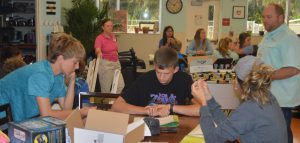 eek, 4-H’ers participate in 4 H National Youth Science Day (NYSD), the world’s largest youth-led science experiment. This year’s 4 H NYSD event will take place on October 4. The 2017 4‑H National Youth Science Day Challenge is called Incredible Wearables! This year’s challenge was developed by University of Nebraska-Lincoln and incorporates the fast-evolving field of wearable technology, teaching kids to not only use technology but to create it and understand how it works.
eek, 4-H’ers participate in 4 H National Youth Science Day (NYSD), the world’s largest youth-led science experiment. This year’s 4 H NYSD event will take place on October 4. The 2017 4‑H National Youth Science Day Challenge is called Incredible Wearables! This year’s challenge was developed by University of Nebraska-Lincoln and incorporates the fast-evolving field of wearable technology, teaching kids to not only use technology but to create it and understand how it works.
From watches and eyewear to fashion and virtual reality headsets, wearable technologies are fast becoming the must-have accessory for forward-thinking people around the world. Wearable technologies didn’t start out as trendy however – one of the world’s first wearable technologies was the hearing aid! Wearable technologies are now used in industries around the globe, from education and sports, to health, fashion, entertainment, transportation and communication. In this year’s challenge, youth use the engineering design process to build a prototype wearable technology that will gather data to help solve a real-world problem. They will design and build their own low-cost wearable health monitor following the engineering design process. This process includes defining the problem, designing and building prototypes (solutions) then systematically testing and evaluating enabling them to redesign for optimization of wearability and functionality.
During the innovative, hands-on project, these future engineers must work together to design, build and refine a wearable health-tracking device that is easy-to-use and aesthetically appealing. In fact, youth from Bay County have been training with their adult leaders to teach this challenge to other youth in their community on National Youth Science Day. Jason Scott, from Scott Innovative Solutions and an engineer at NSA PC, teamed up with the Bay County 4-H Agent to teach youth and adult partner teams about this project enabling them to be able to share their knowledge with others on October 4. When participants will attempt to solve the problem of people not staying active enough to lead healthy lives. In fact, youth will build a prototype fitness tracking device that could ultimately be marketed and sold to consumers to positively affect fitness behaviors.
After completing the challenge youth will have had an experience of using the engineering design process to build a device to help them monitor their health so they can gather data to make better decisions. They will understand more about how wearable technologies like FitBits, Smartwatches and other wearable devices are made.
The field of wearable technologies continues to grow in both quantity and quality. New technologies are being developed and put on the market on a regular basis, including virtual reality and augmented reality devices, clothing and accessories, as well as health monitoring devices. The future of wearable technologies is limited only by the imaginations of those designing them. By studying STEM and participating in this National Youth Science Day Experiment, youth could use technologies to develop products and mechanisms we haven’t even thought of, but definitely desire! To find out more information about other 4-H programs like this or volunteer your time to work with youth, contact your local UF IFAS County Extension Office or visit http://florida4h.org.
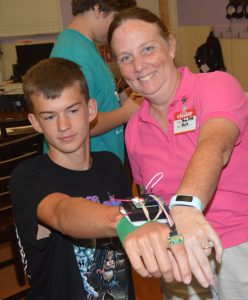
Comparing device to prototype









